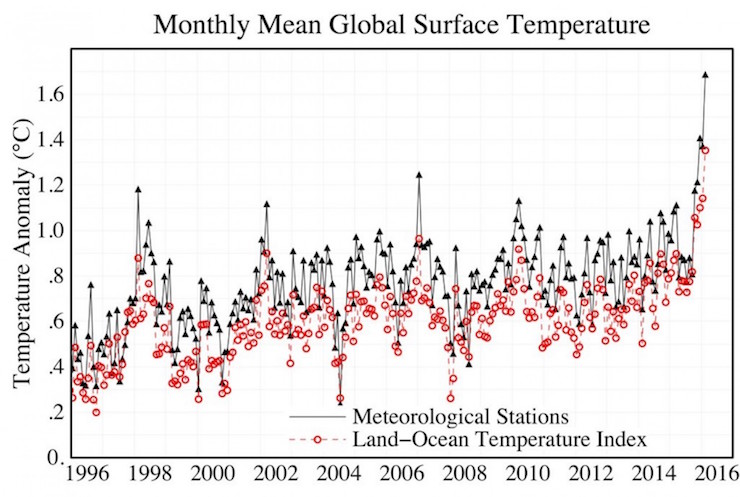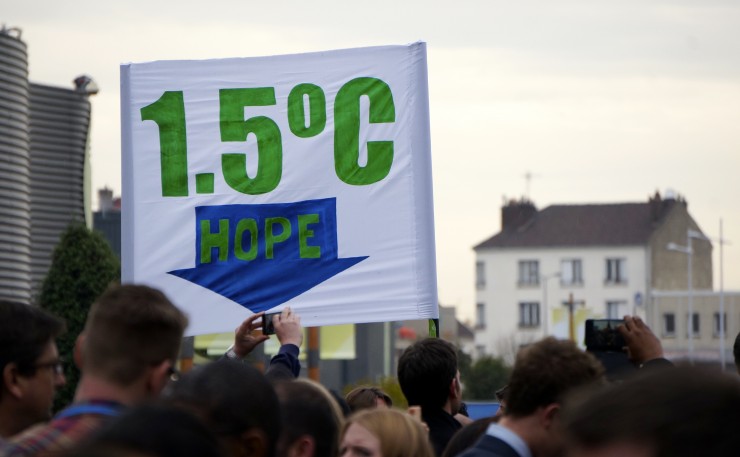While the nation plans to invest billions in defence, the safety and security of the next generation is being traded away. Conservatives are right: we shouldn’t be alarmed about climate change. We should be terrified, writes Ben Eltham.
The scientists have started to run out of adjectives.
“A true shocker,” blogged meteorologists Jeff Masters and Bob Henson.
“Quite stunning … completely unprecedented,” Stefan Rahmstorf, a professor at Germany’s Potsdam Institute of Climate Impact Research and a visiting professorial fellow at the University of NSW, told Fairfax’s Peter Hannam. “Jaw-dropping,” he wrote in a tweet on Sunday.
February Smashes Earth’s All-Time Global Heat Record by a Jaw-Dropping Margin https://t.co/6B937T0Uk9 pic.twitter.com/uZqvum4aVA
— Stefan Rahmstorf (@rahmstorf) March 13, 2016
NASA’s Gavin Schmidt simply tweeted “wow.”
They’re talking about global warming. Temperature data for February 2016 is the warmest on record.
It was a stunning month for the global climate system. Temperatures in the Arctic climbed to levels normally associated with high summer. Sea ice in the Arctic is at its lowest ever level. In January, for the first time since 1942, there was no snowfall in Juneau, Alaksa. Cyclone Winston smashed into Fiji. It was the strongest cyclone ever measured in the southern hemisphere.
Australia has not escaped. In January, ancient Tasmanian pencil pine forests were wiped out by bushfires. They were hundreds of years old. The heatwave over much of Australia in recent weeks has been unprecedented for the month of March … ever. According to the Bureau of Meteorology, “the persistence of the heat in northern Victoria and inland New South Wales has exceeded any previous event in March, and in some areas has been approaching record levels for any time of year.”
The new data is so significant, it’s obliterating climate records. A recent graph published by NASA shows temperatures in February 2016 soaring above the historical records.

In 2015, the world’s nations met at the Paris climate conference. They agreed to try and prevent global temperatures from rising more than 1.5 degrees Celsius above pre-industrial levels.
Just three months later, that dream is dead. The February figures show the world hurtling past the 1.5 degrees figure.
Climate scientists and those of us who worry about global warming are often accused of being “alarmists.”
Looking at these graphs I’m not alarmed. I’m terrified.
I have a five-year old daughter. What sort of world will she grow up in? Global temperatures are heading for levels not seen in millions of years. It makes me weep.
Forget about the Barrier Reef. It’s over. We’re going to lose it. There will be little left by the time my daughter reaches adulthood.
Bleaching this year is already well underway. According to the Great Barrier Reef Marine Park Authority, it is severe on inner reefs. Better book that holiday soon.
Rainfall patterns in Australia are shifting at a scary rate. Rain bands that once used to sweep across Victoria and southern New South Wales in winter have now moved hundreds of kilometres south, over Tasmania.
For Australia, and particularly for the Coalition government, this is the moment the chickens come home to roost.
All the worst fears of the Garnaut Report on climate change (remember that?) are now being realised. Australia is one of the most vulnerable of all industrialised nations to climate change. And yet we remain one of the dirtiest of all rich economies, spewing hundreds of millions of tonnes of carbon into the atmosphere each year, and enthusiastically digging up more.
Just a fortnight ago, the Australian government released a glossy new Defence White Paper, setting out the government’s plans for the defence of the realm. Climate change was given the most perfunctory treatment imaginable. While Australia tools up for an arms race in north Asia, the ecosystems supporting the existence of civilisation are melting away.
You would think that this is a critical moment for the government to invest in climate science. And yet at the very time we are committing to hundreds of billions of dollars of future spending on submarines and joint strike fighters, funding is being cut from the climate science divisions of the CSIRO. It almost beggars belief.
The Coalition’s policies on climate can fairly be described as treason. There is no other word for policies that betray our nation’s future, and the security of our children and grandchildren.
Let’s take a sample of the climate policies of our deeply denialist Coalition government.
The carbon tax has been abolished, and with it the cap on Australia’s emissions. So emissions are rising. Australia’s largest coal mine, at Carmichael in Queensland, has just been approved. The Renewable Energy Target has been slashed, and investment in climate science. Funding for renewable energy and environmental research has been slashed. The Climate Commission was abolished. Hundreds of millions of dollars has been paid to the worst polluters under the cosmic joke of “direct action.”
All this happened under Tony Abbott as prime minister. But Malcolm Turnbull has changed nothing at all.
Labor has a much better record on climate, working diligently to implement a price and cap on carbon in 2012. Labor’s commitment to taking a new emissions trading scheme to the 2016 election is important, even noble.
But even so, Labor remains committed to Australian coal mining, in the bizarre assertion that coal dug up by Australia but burnt in China somehow doesn’t count.
The disconnect between Australian politics and the urgency of our climate crisis is dizzying. Australia’s so-called leaders are a bunch of Neros, fiddling while the atmosphere burns.
When will our political class get it? When will they realise the future of a liveable planet is at stake? Sadly, I think, the answer is that they won’t. They will never get it.
In her stunning book Living in Denial, the sociologist Kari Norgaard studied the reactions of a rural Norwegian township to the onset of a much warmer climate. Even as the local ski industry invested heavily in artificial snow, even as local newspapers made the link to global warming obvious, local residents struggled to understand the enormity of climate change. Understandably, many simply felt overwhelmed by the scale of the challenge. They felt powerless to do anything about it.
But how different is the denial studied by Norgaard to the denial of all of us, everyday? Faced with a crisis as big as climate change, helplessness is often our response. As the University of Southampton’s James Dyke wrote this morning, “we appear disinterested, either through denial or desensitisation, to the environmental changes happening right in front of our eyes.” Towards the end of his distressed and distressing piece, Dyke posed a question:
Know what’s trending on Twitter as I write? A photoshopped giant dog, the latest Game of Thrones trailer and Kim Kardashian’s naked body. Actually, it’s mainly Kim Kardashian’s naked body and people’s responses to it. Followed by people’s responses to the responses.
At least we can’t say we weren’t warned. Climate scientists have been increasingly vocal about the climate emergency for years.
When the reef dies, when the drought strikes, when the fires consume, even then we will try to make excuses. They won’t seem like much to our children, though. Future generations will judge us.
They will say we could have done something. But we didn’t.
Donate To New Matilda
New Matilda is a small, independent media outlet. We survive through reader contributions, and never losing a lawsuit. If you got something from this article, giving something back helps us to continue speaking truth to power. Every little bit counts.





